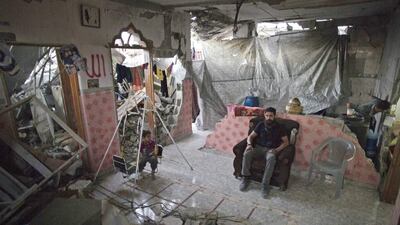GAZA CITY // Gaza reconstruction is moving at a “snail’s pace” and at this rate, it would likely take 30 years to rebuild the extensive damage from last summer’s Israel-Hamas war, a senior UN official said. Roberto Valent, the incoming area chief of a UN agency involved in reconstruction, blamed the delays on the slow flow of promised foreign aid and continued Israeli curbs on the entry of building material to Gaza.
Speaking in the Gaza City office of the UN Development Programme, he said his tour of destroyed neighbourhoods this week was “very, very disheartening”.
Israel and Egypt have severely restricted access to Gaza since the militant Hamas seized the territory in 2007.
After last year’s 50-day war, Israel allowed the import of some cement and steel under UN supervision to ensure the materials would not be diverted by Hamas for military use.
Mr Valent said on Wednesday that the system is too slow and Israel must open Gaza’s borders to allow for the speedy rebuilding or repair of 141,000 homes he said suffered minor to severe damage or were destroyed.
“The housing stock is being reconstructed at such a snail’s pace,” he said. Easing access is not enough and “the real solution is the lifting of restrictions”.
At the current pace, “you will have to wait 30 years to rehabilitate and to reconstruct what has been damaged”, said Mr Valent, the new area chief of the UNDP’s Programme of Assistance to the Palestinian People.
Israel says the system is working, but that construction materials must be closely monitored, arguing that Hamas is again digging military tunnels for which it needs cement and steel.
During the 2014 war, Israeli troops discovered more than 30 tunnels under or near the Israel-Gaza border, including some used by militants to infiltrate into Israel.
In New York, UN political chief Jeffrey Feltman told the Security Council on Wednesday that the pace of reconstruction “remains far too slow” but that the UN-supervised system has been vital for getting building materials into Gaza.
He said close to 90,000 homeowners have received construction materials for repairs and that 135 construction projects were approved by Israel, out of 202 submitted.
Critics of the reconstruction efforts note that not a single home has been rebuilt. Mr Feltman said the construction of 16,000 homes is expected to begin shortly.
He appealed to donors to send promised aid, or the money will run out by September.
Donor countries have pledged US$5.4 billion (Dh19.8bn) in aid, but Palestinian officials say they have received only a fraction so far.
The Israeli group Gisha, which advocates for Gaza civilians, said about 5 million tons of construction materials are needed to rebuild the 2014 war damage.
Israeli officials say they have permitted about 1.3 million tons to enter Gaza since September, but Gisha says the bulk of that was for Qatari-funded development projects, not post-war reconstruction.
According to the UN, more than 2,200 Palestinians, including 1,462 civilians, were killed during the war.
Of the homes under Mr Valent’s purview, some 26,000 suffered minor damage, more than 1,500 were severely damaged and more than 3,400 were destroyed.
The agency needs to pay two years’ worth of rental subsidies for more than 3,700 displaced families, for a total of $31 million – it is currently $20 million short, he said.
Meanwhile, work has begun on repairing 840 of the severely damaged homes. This, he said, “is a drop in the ocean.”* Associated Press

